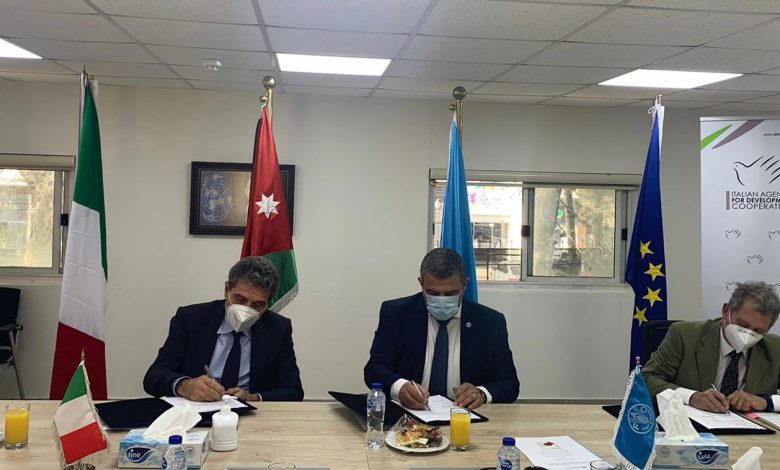
Jordan Daily –The Ambassador of Italy to Jordan, Fabio Cassese, and the Food and Agriculture Organization (FAO) Representative in Jordan, Nabil Assaf, signed today a EUR 1 million agreement to increase the resilience of the Jordanian vulnerable communities through the Italy-funded “Sustainable Production and Utilization of Agro-natural Resources (SPUAR)” project, during a ceremony attended by the Head of Italian Agency for Development Cooperation (AICS) Amman, Emilio Cabasino.
The initiative targets vulnerable communities and their access to socio-economic infrastructures in the governorate of Ma’an, which is the largest in Jordan and, according to the poverty report issued by the Jordanian Department of Statistics, one of the poorest governorates in the Country, with a poverty ratio of 27%.
“In recognition of the importance to support the agriculture sector and sustainable management of natural resources in a country like Jordan challenged by desertification, drought, and land degradation“, said Ambassador Cassese, “Italy’s partnership with FAO focuses on actions to counteract the detrimental impact of resource scarcity upon human development and poverty”.
The scarcity of water resources is indeed one of the main challenges for Jordan and a limiting factor for economic development, especially for the agriculture sector. The demand for water resources is increasing with time for both agriculture and non-agricultural purposes, as the agricultural sector consumes around 510 million cubic meters (51%) of the annual available freshwater.
“In response to the current water scarcity status in Jordan, this project will be implemented in Southern Jordan targeting the most vulnerable households in Ma’an governorate with an enabling environment for women’s enhanced participation, by establishing non-conventional water resources from collecting rainwater for the benefit of agriculture and the enhancement of the well-being of the targeted beneficiaries”, said Mr. Nabil Assaf.
The initiative aims to establish a sustainable enterprise using the Agro-natural resources (land, water, vegetation) available in the targeted governorate. “Within the two-year project,” added Mr. Cabasino, “we aim to target a total of 120 households (660 persons), including female-headed households, youth, and people with disabilities, with actions that include rooftop water harvesting systems and provision of food processing equipment, as well as a capacity-building program to equip beneficiaries with the skills to maximize the use of Agro-natural resources and enhance their livelihood”.
In addition to improved food security and income-generation opportunities, the project will result in soil and water conservation through their sustainable management, and will ultimately contribute to empowering local rural communities.

